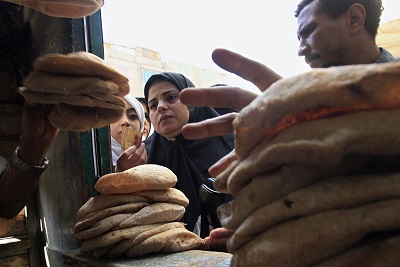Egypt is a land of exquisite—but fragile—ecosystems, such as The Red Sea coral reef, the wetlands bordering the Nile freshwaters, the bitter lakes, and the coastal lagoons. These latter ecosystems are the habitats of migratory birds that constitute 71.8% of the Egyptian bird biodiversity. The evolution of this bird biodiversity is a conspicuous indicator of environmental health.
These ecosystems represent a world heritage of mankind and for that reason have to be preserved. However, how can this global ecological awareness be locally meaningful to poor communities who have a difficult time, today more than ever, feeding their families?
This issue was tackled in a meeting on sustainable development that I attended in Cairo, April 2014, "Cairo Climate Talks". It was said that the local communities can be involved in environmental protection actions that would enhance their financial income, such as ecotourism.
To reach such a goal, numerous economical pathways have to be reorganized, and this needs political courage, vision, and integrity.
The Egyptian population is a fast growing population of more than 86 million inhabitants mostly concentrated along the Nile River and the delta area. If the present rate of growth is maintained, it should reach 150 million by 2050. Considering global warming and the resulting sea level rise, in addition to the insignificant increase of agricultural land over the desert, we have a lot to be concerned with!
Greater Cairo has 20 million inhabitants, which has become an overcrowded, polluted city that is still expanding as small or bigger private investors are still complying with post war reconstruction policies, which are only creating job opportunities on a short-term basis. A drastic, economical transition has to take place!
The key challenges that Egypt has to face nowadays revolve around water, energy, and food and their various interactions. Joint Egyptian and European programs are presently working to tackle these issues, in the framework of sustainable development.
Surviving these challenges needs a territorial reorganization through decentralization. In such a decentralized organization, sewage water would be securely treated for use in small urban units. Renewable energy resources could be adapted to regional configurations: building wind farms along the coastal areas, using the High Dam for the southern part of Egypt and solar energy throughout Egypt. As food provision is concerned, such initiative as growing vegetables on city roofs for neighboring communities could be a solution, mostly that these vegetables are pesticide free, which is health asset.
In a decentralized territorial organization, the traffic is reduced as most services, as education, health and administration are dispatched all over the territory (or at least along the Nile) and the population do not need to go to the capital city seeking for a chimerical "better way of life". This would reduce the carbon dioxide emission, to be blamed for the greenhouse effect.

Educating local communities to protect their own environment would probably counterbalance the wild and endless development of Resort concrete constructions of all kinds that, mostly, do not comply with environmental protocols needed, for example, for the survival of the coral reef, one of the oldest ecosystems known.
I have been living in Egypt for 24 years, and explored its natural treasures that I cherish. As an educator on environmental issues, I have sorted out and analyzed with my students the various environmental problems, such as solid waste management drawbacks, water and air pollution that Cairo is facing, hindering the health of our community.
Thus, for the sake of our children, I have a dream for Egypt future generations that sustainable economy will be implemented.
"It will meet the needs of the present without compromising the ability of future generations to meet their own needs." Brundtland Commission (1987).
References
birdlife.org
schaduf.com
southsouthworld.org/office/ewf-security-dialogue
"István Moldován and Michael Blair, 2010, Birds in Egypt" personal communication of Jean-luc Betoulle, February 2014
Brundtland Commission (1987). Report of the World Commission on Environment and Development. United Nations.